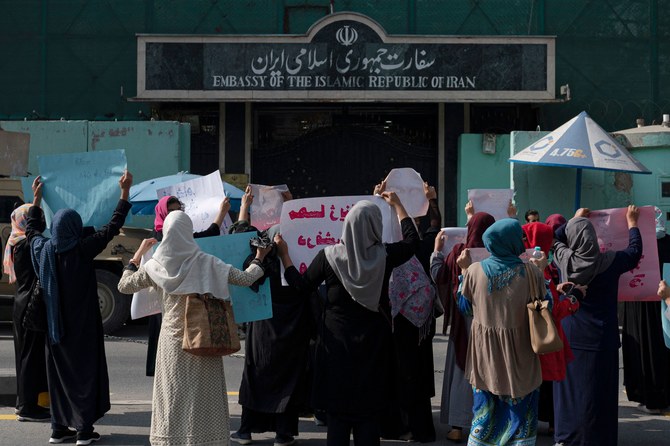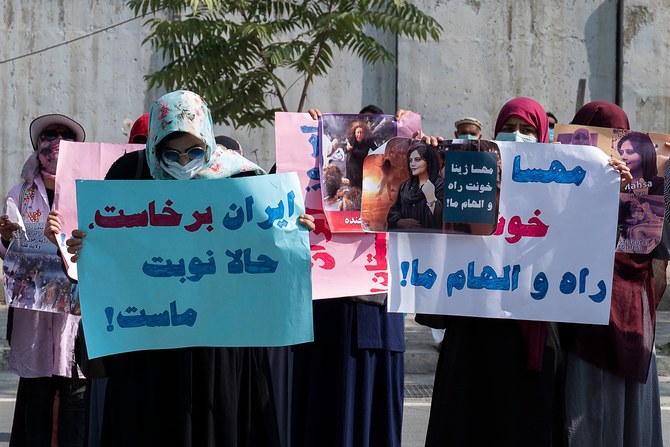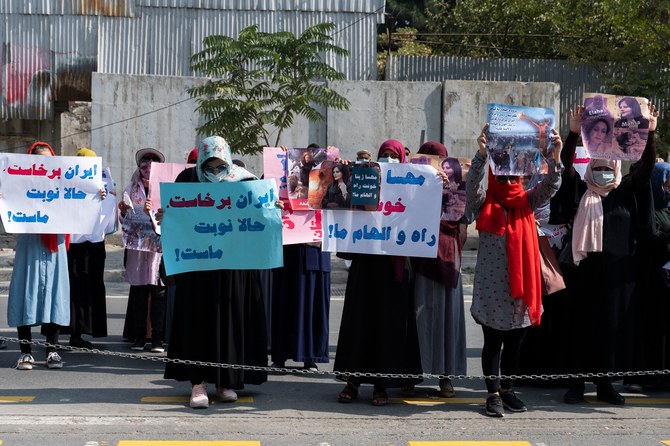KABUL: Taliban forces fired shots into the air on Thursday to disperse a women’s rally supporting protests in Iran over the death of a woman in the custody of morality police.
Deadly protests have erupted in neighboring Iran for the past two weeks, following the death of 22-year-old Mahsa Amini while detained by the Islamic republic’s morality police.
Chanting the same “Women, life, freedom” mantra used in Iran, about 25 Afghan women protested in front of Kabul’s Iranian embassy before being dispersed by Taliban forces firing in the air, an AFP correspondent reported.
Women protesters carried banners that read: “Iran has risen, now it’s our turn!” and “From Kabul to Iran, say no to dictatorship!“
Taliban forces swiftly snatched the banners and tore them in front of the protesters.
Defiant Afghan women’s rights activists have staged sporadic protests in Kabul and some other cities since the Taliban stormed back to power last August.
The protests, banned by the Taliban, contravene a slew of harsh restrictions imposed by the hard-line extremists on Afghan women.
The Taliban have forcefully dispersed women’s rallies in the past, warned journalists against covering them and detained activists helming organization efforts.
An organizer of Thursday’s protest, speaking anonymously, told AFP it was staged “to show our support and solidarity with the people of Iran and the women victims of the Taliban in Afghanistan.”
Since returning to power, the Taliban have banned secondary school education for girls and barred women from many government jobs.
Women have also been ordered to fully cover themselves in public, preferably with the all-encompassing burqa.
So far the Taliban have dismissed international calls to remove the curbs on women, especially the ban on secondary school education.
On Tuesday, a United Nations report denounced the “severe restrictions” and called for them to be reversed.
The international community has insisted that lifting controls on women’s rights is a key condition for recognizing the Taliban government, which no country has so far done.
Taliban fire into air to disperse women’s rally backing Iran protests
https://arab.news/93k6s
Taliban fire into air to disperse women’s rally backing Iran protests

Macron to head to Lebanon after election of new president

- France “will continue to be at the side of Lebanon and its people,” Macron told Aoun in a telephone call
- France administered Lebanon for two decades after World War I and has maintained close ties even since its independence in 1944
PARIS: French President Emmanuel Macron on Thursday welcomed the “crucial election” by Lebanese lawmakers of army chief Joseph Aoun as president and said he would soon visit the country.
Macron spoke with the general hours after Aoun was announced as the leader to end a two-year vacuum in the country’s top post.
France “will continue to be at the side of Lebanon and its people,” Macron told Aoun in a telephone call, the French presidency said in a statement. Macron said he would go to Lebanon “very soon.”
“Congratulations to President Joseph Aoun on this crucial election,” Macron wrote on X earlier.
“It paves the way for reform and the restoration of Lebanon’s sovereignty and prosperity,” he added.
Aoun must oversee a ceasefire in south Lebanon and name a prime minister able to lead reforms demanded by international creditors to save the country from a severe economic crisis.
“The head of state indicated to President Aoun that France would support his efforts to quickly complete the formation of a government capable of uniting the Lebanese, answering their aspirations and their needs, and carrying out the reforms necessary for the economic recovery, reconstruction, security and sovereignty of Lebanon,” said the statement released after the telephone talks.
Macron also vowed support for the “national dialogue” that Aoun said he will launch and called on all groups to “contribute to the success of his mission,” the statement said.
France administered Lebanon for two decades after World War I and has maintained close ties even since its independence in 1944.
Quaker group halts New York Times ads over ‘Gaza genocide’ language dispute

- American Friends Service Committee claims newspaper asked it to replace word ‘genocide’ with ‘war’
- Proposed ad urged US Congress to ‘stop arming Israel’s genocide in Gaza’
LONDON: An American Quaker group has paused its advertisements with the New York Times after the newspaper refused to allow the use of the term “genocide” to describe Israel’s actions in Gaza.
“The refusal of the New York Times to run paid digital ads that call for an end to Israel’s genocide in Gaza is an outrageous attempt to sidestep the truth,” said Joyce Ajlouny, general secretary of the American Friends Service Committee, a Quaker organization that advocates for peace.
“Palestinians and allies have been silenced and marginalized in the media for decades as these institutions choose silence over accountability. It is only by challenging this reality that we can hope to forge a path toward a more just and equitable world.”
The controversy arose after the AFSC submitted an ad with the text: “Tell Congress to stop arming Israel’s genocide in Gaza now! As a Quaker organization, we work for peace. Join us. Tell the president and Congress to stop the killing and starvation in Gaza.”
The New York Times’ advertising team reportedly requested that the AFSC replace the word “genocide” with “war.” When the AFSC refused, the newspaper’s ad acceptability team said that “differing views on the situation” required adherence to “factual accuracy and legal standards” to ensure compliance with its guidelines.
A spokesperson for the New York Times said in response to questions from The Guardian in the UK: “New York Times advertising works with parties submitting proposed ads to ensure they are in compliance with our acceptability guidelines.
“This instance was no different, and is entirely in line with the standards we apply to all ad submissions.”
However, the AFSC strongly criticized the decision, pointing out that many human rights organizations, legal scholars, and even the UN have described Israel’s actions in Gaza as genocide or genocidal acts.
“The suggestion that the New York Times couldn’t run an ad against Israel’s genocide in Gaza because there are ‘differing views’ is absurd,” said Layne Mullett, director of media relations for the AFSC.
“The New York Times advertises a wide variety of products and advocacy messages on which there are differing views. Why is it not acceptable to publicize the meticulously documented atrocities committed by Israel and paid for by the United States?”
The AFSC also pointed to The Washington Post’s recent decision to run an Amnesty International ad that also used the term genocide, questioning why the New York Times applied different standards.
The Quaker group has been involved in humanitarian work in Gaza since 1948 and currently operates in Gaza, Ramallah, and Jerusalem. Since October 2023, the AFSC’s staff in Gaza have provided 1.5 million meals, hygiene kits, and other essential aid to displaced individuals. The organization is also lobbying for a permanent ceasefire, full humanitarian access, the release of captives, and an end to US military funding for Israel.
According to The Guardian, the New York Times has previously run advertisements using the term genocide.
In 2016, it published an ad from the Armenian Educational Foundation thanking Kim Kardashian for opposing denial of the Armenian genocide. In 2008, presidential candidates Barack Obama, Hillary Clinton and John McCain co-signed a letter advertisement in the New York Times calling out the genocide in Sudan’s Darfur.
It also noted that while the New York Times reserves the right to reject ads it deems inaccurate or deceptive, its advertising guidelines state that “advertising space is open to all points of view” and submissions may be subject to fact-checking.
Israel rallies global support to win release of a woman believed kidnapped in Iraq

- The official said Thursday that the matter was raised in a meeting of special envoys for hostage affairs in Jerusalem this week
- Israel and Iraq do not have diplomatic relations
JERUSALEM: A senior Israeli official says the government is working with allies in a renewed push to win the freedom of an Israeli-Russian researcher who is believed to have been kidnapped in Iraq nearly two years ago.
The official said Thursday that the matter was raised in a meeting of special envoys for hostage affairs in Jerusalem this week.
He said the envoys met the family of Elizabeth Tsurkov and that Israel asked the representatives – from the US, UK, Germany, Austria and Canada – to have their embassies in Baghdad lobby the Iraqi government and search for a way to start negotiations. Israel and Iraq do not have diplomatic relations. He said he hopes other countries will help.
“We are counting on our allies,” the official said, speaking on condition of anonymity because he was discussing closed-door discussions. “And I hope that other nations will suggest assistance in helping us release Elizabeth. Many nations have embassies and contacts with the Iraqi government.”
Tsurkov, a 38-year-old student at Princeton University, disappeared in Baghdad in March 2023 while doing research for her doctorate. She had entered the country on her Russian passport. The only sign she was alive has been a video broadcast in November 2023 on an Iraqi television station and circulated on pro-Iranian social media purporting to show her.
No group has claimed responsibility for the kidnapping. But Israel believes she is being held by Kataib Hezbollah, an Iranian-backed Iraqi militia that it says also has ties to the Iraqi government.
The Israeli official said that after months of covert efforts, Israel believes the “changes in the region” have created an opportunity to work publicly for her release.
During 15 months of war, Israel has struck Iran and its allies, and Iran’s regional influence has diminished. Iraq also appears to have pressured militia groups into halting their aerial attacks against Israel.
Authority warns against overuse of ginseng by pregnant women, says no proof of safety

- Adverse effects of the plant-based supplement include insomnia or high blood pressure when used in large doses, warns SFDA
- It stressed that stressed that herbal supplements should be used with caution, like any other medicine
RIYADH: The Saudi Food and Drug Authority has warned against overuse of the herb ginseng due to possible negative side-effects and the lack of evidence of its safety for pregnant and breastfeeding women.
Adverse effects of the plant-based supplement include insomnia or high blood pressure when used in large doses, and the SFDA warned that there was no proof of it being safe to use during pregnancy, according to the Saudi Press Agency.
In addition, the herb may interfere with medicines for blood thinners, diabetes, heart conditions, insomnia and schizophrenia, and can interact negatively with caffeine, it said.
Ginseng, known by its scientific name Panax ginseng, is used in alternative medicine for its purported effects on energy levels, concentration and mood.
The recommended average dose is between one and two grams of the root, taken three to four times a day, for between three and four weeks, according to the report.
SFDA further stressed that herbal supplements should be used with caution, like any other medicine.
It added that claims about the safety of such supplements not supported by evidence should be handled with caution, and advised consulting a doctor before using them.
Herbal supplements can also interfere with certain foods, as well as medication, the authority added.
SFDA provides a list of prohibited medicinal plants and cosmetic products on its official website: https://www.sfda.gov.sa/ar/informationlist/66327.
KACST graduates 46 deep-tech startups from Venture Program

- Scheme turns research into marketable products
- Energy, healthcare, renewables sectors represented
RIYADH: Forty-six deep-tech startups graduated from the King Abdulaziz City for Science and Technology’s Venture Program in a recent ceremony.
The graduating startups come from a diverse range of sectors, including energy, healthcare, renewable resources and emerging technologies.
Notable participants included Glass Earth KSA, which specializes in geospatial technology solutions for environmental monitoring; PainTech Solutions, a company developing innovative approaches to pain management and medical treatments; and EA Systems, focused on advanced engineering solutions for industrial automation and efficiency.
The KACST Venture Program is an initiative designed to support deep-tech startups by providing resources, mentorship, and strategic partnerships to transform research into marketable products and services.
The program was supported by the National Technology Development Program, which also granted technology licenses to a number of private sector firms.
Held at KACST’s The Garage startup incubator in Riyadh, the graduation ceremony brought together key stakeholders, including government officials, researchers and private investors.
Among the dignitaries in attendance was Munir El-Desouki, president of KACST, who praised the initiative’s role in advancing Saudi Arabia’s economic transformation.
Khalid Al-Dakkan, senior vice president of innovation at KACST, said: “At KACST, we worked to connect emerging companies with the government and private sectors, and investors to develop ideas and innovations, and transform them into marketable products and services to support the national economy.”
Al-Dakkan also pointed to the inclusion of strategic partners in the program’s next phase. “The KVP program, in its new version, includes the inclusion of a number of strategic partners to strengthen the innovation system and support the economy,” he said.
The new iteration will involve partnerships with four Saudi universities to foster a vibrant entrepreneurial culture while targeting fields such as clean energy, artificial intelligence and health technologies.
Ibrahim Neyaz, CEO of NTDP, underscored the program’s importance in driving growth in emerging sectors.
“The KACST program for creating emerging companies aims to support and empower owners of innovative technology projects and encourage national companies to invest in emerging technologies to raise their share in the local market, and provide initiatives that help in developing technologies,” he said.

























